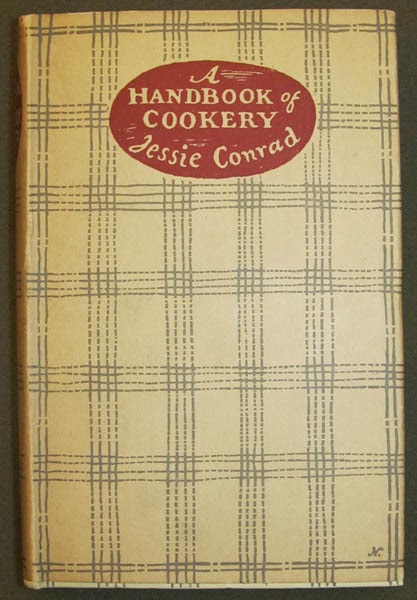This week’s post comes from our intern Callan Carrow, who wrote a few weeks ago about the Whitman massacre
– – – – –
Though you may be
familiar with Heart of Darkness author Joseph Conrad, you probably
haven’t heard of his wife, Jessie Conrad. An Englishwoman from a working-class
background, she married Joseph, who was sixteen years her senior, in 1896. And
she was in fact an author in her own right — a cookbook author, that is.
familiar with Heart of Darkness author Joseph Conrad, you probably
haven’t heard of his wife, Jessie Conrad. An Englishwoman from a working-class
background, she married Joseph, who was sixteen years her senior, in 1896. And
she was in fact an author in her own right — a cookbook author, that is.
 |
| Jessie Conrad. A Handbook of Cookery for a Small House. London, 1923. The Rosenbach of the Free Library of Philadelphia |
Jessie Conrad’s A
Handbook of Cookery for a Small House, from the Rosenbach’s collections,
was first published in 1923 as a practical, everyday guide to cooking for a
modest 4-person household. In the Introduction, Jessie gives advice on the
amount of time and care required for good cooking:
“Cooking ought not to
take too much of one’s time. One hour and a half to two hours for lunch, and
two and a half for dinner is sufficient…For my part I never went into the
kitchen before half-past eleven for a half-past one lunch of three dishes. But
once the cooking is begun one must give all one’s attention and care to it. No
dish, however simple, will cook itself…
take too much of one’s time. One hour and a half to two hours for lunch, and
two and a half for dinner is sufficient…For my part I never went into the
kitchen before half-past eleven for a half-past one lunch of three dishes. But
once the cooking is begun one must give all one’s attention and care to it. No
dish, however simple, will cook itself…
The bane of life in a
small house is the smell of cooking. Very few are free from it. And yet it need
not be endured at all. This evil yields to nothing more heroic than a simple
but scrupulous care in all the processes in making food ready for consumption.”
small house is the smell of cooking. Very few are free from it. And yet it need
not be endured at all. This evil yields to nothing more heroic than a simple
but scrupulous care in all the processes in making food ready for consumption.”
Jessie apparently took
her cooking very seriously. Despite her reputation as a generous hostess, she
reportedly once heaped her wrath upon Ford Madox Ford, a friend of her
husband’s, after he left his wet trilby hat in her oven to dry while she was
cooking her Sunday roast.
her cooking very seriously. Despite her reputation as a generous hostess, she
reportedly once heaped her wrath upon Ford Madox Ford, a friend of her
husband’s, after he left his wet trilby hat in her oven to dry while she was
cooking her Sunday roast.
Joseph Conrad, who
seemed an appreciative recipient of his wife’s cooking, contributed to the book
in the opening Preface. He praises the cookbook as the most morally pure form
of writing:
seemed an appreciative recipient of his wife’s cooking, contributed to the book
in the opening Preface. He praises the cookbook as the most morally pure form
of writing:
“Of all the books
produced since the most remote ages by human talents and industry those only
that treat of cooking are, from a moral point of view, above suspicion. The
intention of every other piece of prose may be discussed and even mistrusted;
but the purpose of a cookery book is one and unmistakable. Its object can
conceivably be no other than to increase the happiness of mankind.”
produced since the most remote ages by human talents and industry those only
that treat of cooking are, from a moral point of view, above suspicion. The
intention of every other piece of prose may be discussed and even mistrusted;
but the purpose of a cookery book is one and unmistakable. Its object can
conceivably be no other than to increase the happiness of mankind.”
A Handbook of Cookery seems to have been well-received during its time. The Delineator, an American women’s magazine, featured the
book in its August 1922 issue. Praising Jessie as an accomplished wife and
homemaker, it reported that she “kept the home together and made it famous for
the spirit and quality of its hospitality,” and that “the simple meals served
at the Conrad home became famous.” London’s The Spectator also gave the book this brief review on June 22, 1923:
book in its August 1922 issue. Praising Jessie as an accomplished wife and
homemaker, it reported that she “kept the home together and made it famous for
the spirit and quality of its hospitality,” and that “the simple meals served
at the Conrad home became famous.” London’s The Spectator also gave the book this brief review on June 22, 1923:
“Charming preface by
Joseph Conrad is a pleasant surprise in a cookery book. It is a good book, too:
the directions are clear and simple and we feel that if a recipe turned out
badly we could put our failure down to only our own clumsiness and stupidity.”
Bon appétit!
